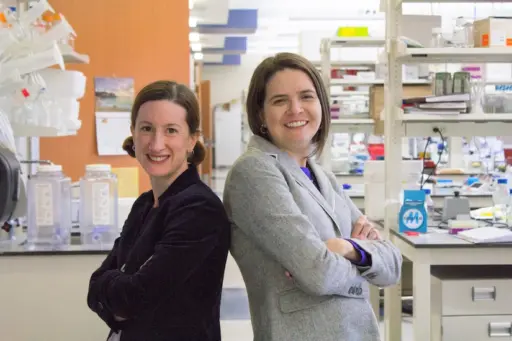A good mentor can make all the difference for finding the right career path. For biomedical engineering graduate student Amani Gillette, that difference was so striking that she wanted to give back to the mentored research program that had been critical for homing in on her own professional niche.
So in summer 2016, when Gillette was just starting her graduate training at the University of Wisconsin-Madison, she asked her PhD advisor Melissa Skala if she could mentor a high school student in the Biotechnology Youth Apprenticeship Program. Gillette herself had participated in it as a senior at Madison’s La Follette High School six years earlier.
Skala, an associate professor of biomedical engineering at the University of Wisconsin-Madison and the Morgridge Institute for Research, happily agreed. Since January 2017, Gillette has mentored Ava VanDommelen, a high school junior from DeForest, Wisconsin, in developing optical technologies for personalized cancer treatment.
Skala says the program, which is run by the Biopharmaceutical Technology Center Institute in Madison, has a much more rigorous design than typical six-week programs aimed at giving high school students early exposure to a research lab.
 Biomedical engineering professors Kristyn Masters (left) and Pamela Kreeger have published an expectations document to supplement career development plans for federally funded research trainees. Photo by Elise Schimke.
Biomedical engineering professors Kristyn Masters (left) and Pamela Kreeger have published an expectations document to supplement career development plans for federally funded research trainees. Photo by Elise Schimke.
“In addition to getting high school credit, the students can earn a biotechnology certificate that requires 900 hours in the lab,” Skala says. “If they start as juniors, they’re in the lab for a few hours every day after school and then much longer in the summer. I think this sustained 18-month commitment, combined with structured mentoring and a well-defined project, is key for creating a valuable experience for both students and mentors.”
Part of the reason a longer program is valuable, Skala says, is that it gives young students enough time to get up to speed with lab equipment and protocols. Once they have become productive, they are more likely to experience the fun part of research that involves asking (and answering) interesting questions. Skala also appreciates the program’s requirement for regular meetings between mentors and high school guidance counselors and its evening classes, which teach students basic lab skills.
VanDommelen’s research contributions (also noted in a Nature career feature) were so greatly appreciated that Skala had no trouble finding a second mentor a year later, when program coordinator Barbara Bielec asked if she would like to take on another youth apprentice. Isabel Jones, a junior at the Verona Area High School, began working with senior scientist Alex Walsh in January 2018.
Gillette credits the mentoring program for helping her make good decisions about her postsecondary education. As a youth apprentice from 2010 to 2011, she worked on basic biology in the UW-Madison Department of Medical Microbiology and Immunology, with Professor Margaret McFall-Ngai. Realizing that she wanted to move from basic to translational biology, she majored in biomedical engineering at Michigan Technological University before pursuing her PhD in Skala’s lab.
But Skala is not the only biomedical engineering professor who takes mentoring seriously. Her colleague Kristyn Masters is the faculty co-director of the Women in Science and Engineering (WISE) program, a supportive residential and learning community of female undergraduate students with science, technology, engineering and math (STEM) majors that has existed since 1995.
The program, now housed in a women-only floor in Waters Residence Hall, organizes regular talks and networking events with successful professional women in these traditionally male-dominated fields. Skala has participated in WISE events, as has her colleague Pamela Kreeger and many other engineering professors.
In addition to talks, networking and a variety of other social and enrichment activities, WISE pairs students with older female peer mentors in STEM majors—an approach that is highly effective in helping women succeed in technical fields, according to a 2017 study by researchers at the University of Massachusetts, Amherst.
But mentoring doesn’t end with college graduation and is important for men, too. That’s why Masters and Kreeger recently co-authored an article in the journal PLOS Computational Biology, titled “Ten simple rules for developing a mentor-mentee expectations document.” It is relevant for all students, including those at the graduate and postdoctoral training stage, and for mentors in many fields.
Masters and Kreeger, both of whom also regularly work with Madison high school students, provided a template for 10 concrete steps that mentor and mentee can take to develop and maintain a positive and productive relationship. They believe this document is a helpful addition to the individual development plans that are required for managing the professional development of federally funded trainees.
The current development plans define big-picture expectations and are effective for achieving long-term career goals, but they lack the nitty-gritty details of daily lab operations that are just as important for ensuring positive and healthy regular interactions between mentor and mentee.
“Mentoring is both the best and the hardest part of being a professor,” Kreeger says. “Nothing else brings me as much satisfaction as seeing a student reach their career goal and know that I was a part of that process. While this is also possible with students I meet through classroom teaching, it is much more intense and tangible with the undergraduate and graduate students who are in my lab for several years.”